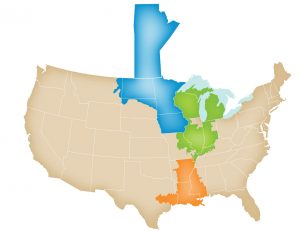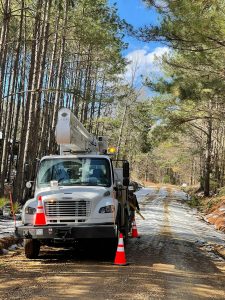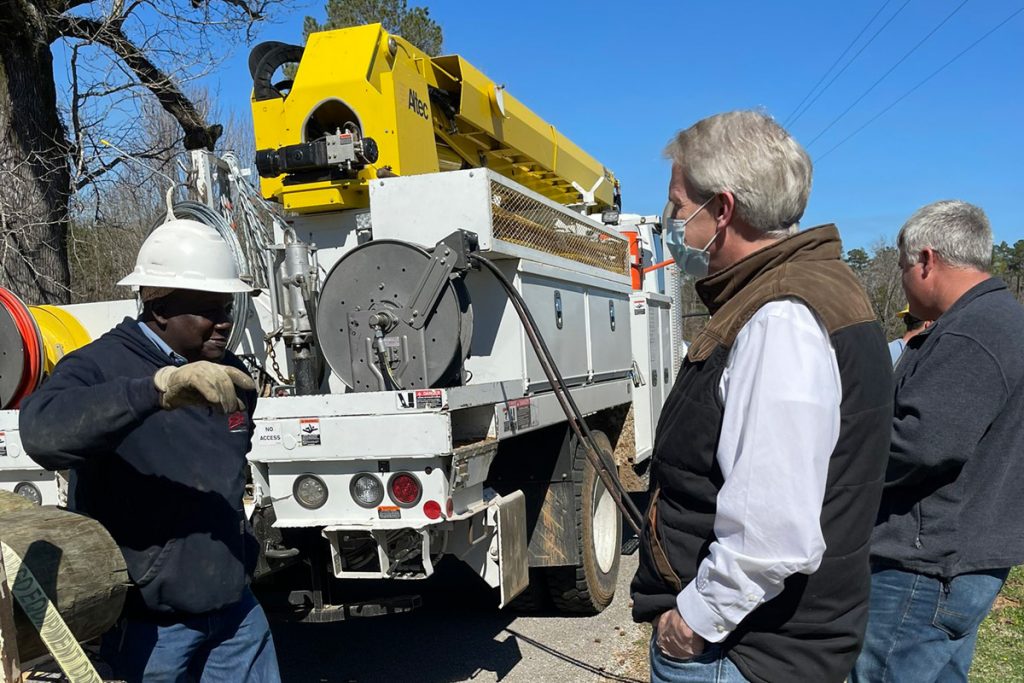As Mississippi recovers from the worst winter storm since the mid-1990s, Northern District Public Service Commissioner Brandon Presley is calling for a re-evaluation of Mississippi’s membership in its regional transmission organization, which manages the transmission, sale and conservation of power across multiple states.
Presley’s complaint follows a period late last Tuesday night when Mississippi was subject to rolling power outages as the deep freeze swept the South. Mississippi’s experience with the outages was fortunately brief—but the commissioner argued on social media that the state’s forced outages represented a market failure.

“Last night, no MS power plants failed and our utilities were actually producing more power than needed. Yet, we were forced to have a series of forced outages based on market failures. While we’ve seen savings from @MISO_energy membership, we must now reevaluate that value to MS,” Presley tweeted on Feb. 17.
MISO, the Midcontinent Independent System Operator, serves as a wholesale energy market for much of west and south Mississippi, providing for the sale of excess energy to offset costs when the state is producing a surplus—and allows the state access to the open market when energy is needed.
“On Tuesday night, we were producing 800 more megawatts of electricity than was needed in Mississippi: in a typical scenario, you sell that electricity on the open market, for whatever the going price is, and at the same time, we’re able to buy power when we made it,” Presley told the Mississippi Free Press in an interview.
But Tuesday night, Feb. 16, was the furthest thing from a typical scenario imaginable. Across the South, all forms of energy generation faced critical failures.
“Natural gas plants put off a lot of steam. Well, that steam freezes. Once that happens, you’ve got a buildup problem. You’ve got temperatures that are in the single digits for a sustained period of time. The other thing is renewable power is not able to produce. You’ve got issues across the spectrum of power generation,” Presley said.
Presley was pleased to note that none of the plant failures that had occurred Tuesday night had been in Mississippi—and yet, that same night, many Mississippians experienced outages not because the ice storm had damaged their local infrastructure, but because Mississippi’s membership in MISO obligated it to transmit energy outside the state.
“The public heeded our calls for conservation,” Presley said. “Mississippians responded. We were producing more power than we needed—and yet we were asked by the grid operator to have forced outages on the same pro-rated basis as other areas where failures occurred. Mississippians should not be punished for their electric utilities being well-operated.”
The Unique Texas Crisis
Presley’s eyes are on the epicenter of the disaster in Texas, where millions of residents lost power as the state’s independent energy grid collapsed under the weight of winter storm Uri. Charts from The New York Times show how icy weather massively disrupted power generation across the state, with key failures in the natural-gas sector.
Texas’ situation is unique in the continental U.S., after a late 1990s deregulation push placed the majority of the state on its own power grid. While most of the U.S. is divided between the Western and Eastern Interconnection, with regional transmission organizations managing the open market in different areas, Texas stands alone and depends on its own extensive energy generation to supply its grid.
With Uri bearing down on its key energy sources, and a long-standing failure to properly winterize energy infrastructure, that supply was simply not enough. The crisis continues, with more than 30 deaths and many Texans still waiting for power.
Presley considers Mississippi incredibly fortunate to have evaded the tragedy that unfolded in Texas last week. But he says the Magnolia State may not be so lucky next time. “Our utilities performed extraordinarily well. But we have to ask some tough questions about winterization. About forced outages … I won’t see this happening in other places and whistle past the graveyard,” Presley said.
Reforms and Incentives
MISO membership, which much of Mississippi obtained in 2013 on Department of Justice orders, is a balancing act for the state. Presley and Entergy alike estimate that Mississippi saves roughly $50 million a year through MISO membership.

But those savings come with a lack of independence, as last week’s brief outages showed. Presley is not overly concerned with the specific outages, which lasted less than two hours. Rather, he is worried that future crises could more seriously compromise the state’s power supply even if it maintains a properly winterized grid.
“Are there changes in the regulatory work of the commission that will incentivize reliability? Are there mechanisms within the MISO market that could be adjusted to incentivize winterization?” he asked. “Those are just appropriate questions to ask. I shouldn’t be in office if I as a commissioner look at what happened in Texas, then said let’s go stick our heads in the sand.”
Presley stressed that Mississippi would not under any circumstances attempt to replicate Texas’ disconnected grid strategy. Detaching the state from MISO would still allow it to purchase on the open market and sell excess energy there as well. Nor is Presley is ready to commit to a full separation from MISO. But he indicated a strong interest in reform.
“If you’re doing everything you’re supposed to be doing, you’re producing your own power, you’re serving your customers, and yet some other place has failures—should you be forced to be treated the same, or should there be some kind of pecking order?” Presley asked. “I’m not saying I have all the answers right now. But we have to look at this with a sober, clear-headed approach.”
The Mississippi Free Press requested an interview with a MISO representative and, in return, received the following statement from Brandon D. Morris, MISO strategic communications adviser.
“MISO, a not-for-profit member-based organization, provides access to reliable, least-cost energy through its energy markets and long-term transmission planning. By being a member of MISO, Mississippians benefit from a diverse and flexible fuel mix, equal access to energy markets and a holistic, unbiased view of transmission line planning. Member utilities across the state often publicly share the benefits they’ve experienced since joining MISO.
“During emergency situations, decisions are being made quickly to protect the integrity of the bulk electric system. On Tuesday, MISO declared an emergency event (Max Gen Event – EEA 3) which instructed member utilities in the South Region (including most of Arkansas, Louisiana, Mississippi and Southeast Texas) to implement periodic power outages. This was effective 02/16/2021 19:40 EST until 02/17/2021 01:00 EST. At a Max Gen Event – EEA2 or above, members are instructed to make a public appeal conservation. MISO issued two ahead of the load shed event at 02/16/2021 08:00 EST until 02/16/2021 22:00 EST and 02/16/2021 18:35 EST until 02/17/2021 01:00 EST. The MISO Operating Procedures and MISO Operating Conditions FAQs to better understand the necessary steps to manage system demand and ensure grid reliability.”









